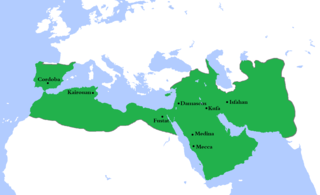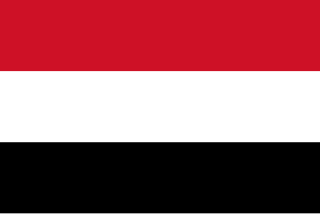
Al-Qaeda is a militant Sunni Islamist multi-national organization founded in 1988 by Osama bin Laden, Abdullah Azzam, and several other Arab volunteers during the Soviet invasion of Afghanistan.

Alphonse Gabriel Capone, sometimes known by the nickname "Scarface", was an American gangster and businessman who attained notoriety during the Prohibition era as the co-founder and boss of the Chicago Outfit. His seven-year reign as crime boss ended when he was 33.

Baghdad is the capital of Iraq. The population of Baghdad, as of 2016, is approximately 8,765,000, making it the largest city in Iraq, the second largest city in the Arab world, and the second largest city in Western Asia.
The history of Islam concerns the political, social, economic and developments of the Islamic civilization. Despite concerns about the reliability of early sources, most historians believe that Islam originated in Mecca and Medina at the start of the 7th century, approximately 600 years after the founding of Christianity. Muslims, however, believe that it did not start with Muhammad, but that it was the original faith of others whom they regard as prophets, such as Jesus, David, Moses, Abraham, Noah and Adam.

Muhammad was the founder of Islam. According to Islamic doctrine, he was a prophet, sent to present and confirm the monotheistic teachings preached previously by Adam, Abraham, Moses, Jesus, and other prophets. He is viewed as the final prophet of God in all the main branches of Islam, though some modern denominations diverge from this belief. Muhammad united Arabia into a single Muslim polity, with the Quran as well as his teachings and practices forming the basis of Islamic religious belief.

Mecca, also spelled Makkah, is a city in the Hejazi region of the Arabian Peninsula, and the plain of Tihamah in Saudi Arabia, and is also the capital and administrative headquarters of the Makkah Region. The city is located 70 km (43 mi) inland from Jeddah in a narrow valley at a height of 277 m (909 ft) above sea level, and 340 kilometres (210 mi) south of Medina. Its resident population in 2012 was roughly 2 million, although visitors more than triple this number every year during the Ḥajj period held in the twelfth Muslim lunar month of Dhūl-Ḥijjah.

Osama bin Mohammed bin Awad bin Laden, also rendered Usama bin Ladin, was a founder of the pan-Islamic militant organization al-Qaeda. He was a Saudi Arabian until 1994, a member of the wealthy bin Laden family, and an ethnic Yemeni Kindite.

An-Nasir Salah ad-Din Yusuf ibn Ayyub, known as Salah ad-Din or Saladin, was the first sultan of Egypt and Syria and the founder of the Ayyubid dynasty. A Sunni Muslim of Kurdish ethnicity, Saladin led the Muslim military campaign against the Crusader states in the Levant. At the height of his power, his sultanate included Egypt, Syria, Upper Mesopotamia, the Hejaz, Yemen and other parts of North Africa.

Sunni Islam is the largest denomination of Islam, followed by nearly 90% of the world's Muslims. Its name comes from the word sunnah, referring to the behaviour of the Islamic prophet Muhammad. The differences between Sunni and Shia Muslims arose from a disagreement over the succession to Muhammad and subsequently acquired broader political significance, as well as theological and juridical dimensions.

The Umayyad Caliphate, also spelt Omayyad, was the second of the four major caliphates established after the death of Muhammad. The caliphate was ruled by the Umayyad dynasty, hailing from Mecca. The third Caliph, Uthman ibn Affan, was a member of the Umayyad clan. The family established dynastic, hereditary rule with Muawiya ibn Abi Sufyan, long-time governor of Syria, who became the sixth Caliph after the end of the First Muslim Civil War in 661. After Mu'awiyah's death in 680, conflicts over the succession resulted in a Second Civil War and power eventually fell into the hands of Marwan I from another branch of the clan. Syria remained the Umayyads' main power base thereafter, and Damascus was their capital.

The Abbasid Caliphate was the third of the Islamic caliphates to succeed the Islamic prophet Muhammad. It was founded by a dynasty descended from Muhammad's uncle, Abbas ibn Abdul-Muttalib, from whom the dynasty takes its name. They ruled as caliphs for most of the caliphate from their capital in Baghdad in modern-day Iraq, after having overthrown the Umayyad Caliphate in the Abbasid Revolution of 750 CE (132 AH).

The United Arab Emirates, sometimes simply called the Emirates, is a country in Western Asia at the southeast end of the Arabian Peninsula on the Persian Gulf, bordering Oman to the east and Saudi Arabia to the south, as well as sharing maritime borders with Qatar to the west and Iran to the north. The sovereign constitutional monarchy is a federation of seven emirates consisting of Abu Dhabi, Ajman, Dubai, Fujairah, Ras Al Khaimah, Sharjah and Umm Al Quwain. Their boundaries are complex, with numerous enclaves within the various emirates. Each emirate is governed by a ruler; together, they jointly form the Federal Supreme Council. One of the rulers serves as the President of the United Arab Emirates. In 2013, the UAE's population was 9.2 million, of which 1.4 million are Emirati citizens and 7.8 million are expatriates.

Mamluk is an Arabic designation for slaves. The term is most commonly used to refer to slave soldiers and Muslim rulers of slave origin.

Yemen , officially known as the Republic of Yemen, is a country at the southern end of the Arabian Peninsula in Western Asia. Yemen is the second-largest Arab sovereign state in the peninsula, occupying 527,970 square kilometres. The coastline stretches for about 2,000 kilometres. It is bordered by Saudi Arabia to the north, the Red Sea to the west, the Gulf of Aden and Guardafui Channel to the south, and the Arabian Sea and Oman to the east. Yemen's territory includes more than 200 islands.

The Buyid dynasty or the Buyids, also known as Buwaihids, Bowayhids, Buyahids, or Buyyids, was a Shia Iranian dynasty of Daylamite origin. Coupled with the rise of other Iranian dynasties in the region, the approximate century of Buyid rule represents the period in Iranian history sometimes called the 'Iranian Intermezzo' since, after the Muslim conquest of Persia, it was an interlude between the rule of the Abbasid Caliphate and the Seljuk Empire.

A caliphate is an Islamic state under the leadership of an Islamic steward with the title of caliph, a person considered a religious successor to the Islamic prophet Muhammad and a leader of the entire ummah (community). Historically, the caliphates were polities based
in Islam which developed into multi-ethnic trans-national empires. During the medieval period, three major caliphates succeeded each other: the Rashidun Caliphate (632–661), the Umayyad Caliphate (661–750) and the Abbasid Caliphate (750–1258). In the fourth major caliphate, the Ottoman Caliphate, the rulers of the Ottoman Empire claimed caliphal authority from 1517. During the history of Islam, a few other Muslim states, almost all hereditary monarchies, have claimed to be caliphates.

The September 11 attacks were a series of four coordinated terrorist attacks by the Islamic terrorist group al-Qaeda against the United States on the morning of Tuesday, September 11, 2001. The attacks killed 2,996 people, injured over 6,000 others, and caused at least $10 billion in infrastructure and property damage. Additional people died of 9/11-related cancer and respiratory diseases in the months and years following the attacks.

The Islamic State of Iraq and the Levant, also known as the Islamic State of Iraq and Syria, officially as the Islamic State (IS) and by its Arabic language acronym Daesh, is a Salafi jihadist militant group and former unrecognised proto-state that follows a fundamentalist, Salafi doctrine of Sunni Islam. ISIL gained global prominence in early 2014 when it drove Iraqi government forces out of key cities in its Western Iraq offensive, followed by its capture of Mosul and the Sinjar massacre.

Bahrain, officially the Kingdom of Bahrain, is an island country in the Persian Gulf. The sovereign state comprises a small archipelago centered around Bahrain Island, situated between the Qatar peninsula and the north eastern coast of Saudi Arabia, to which it is connected by the 25-kilometre (16 mi) King Fahd Causeway. Bahrain's population is 1,234,571, including 666,172 non-nationals. It is 765.3 square kilometres (295.5 sq mi) in size, making it the third-smallest nation in Asia after the Maldives and Singapore.
Al Jazeera, also known as JSC, is a state-funded broadcaster in Doha, Qatar, owned by the Al Jazeera Media Network. Initially launched as an Arabic news and current-affairs satellite TV channel, Al Jazeera has since expanded into a network with several outlets, including the Internet and specialty television channels in multiple languages.



















